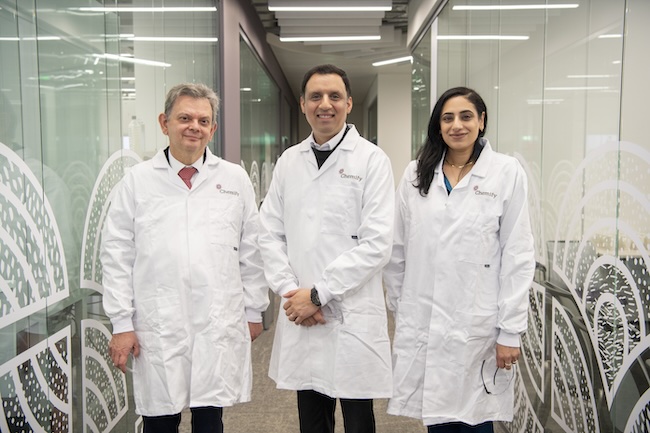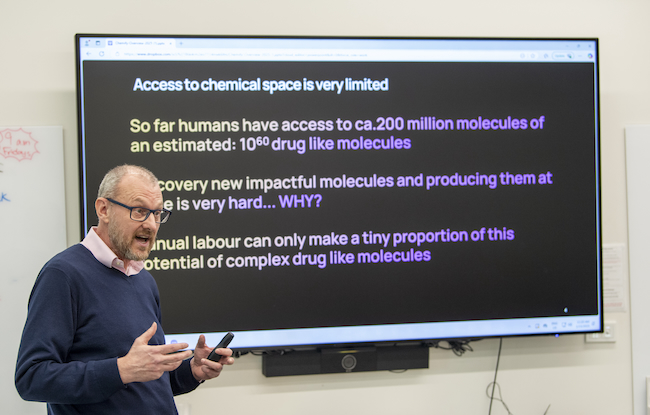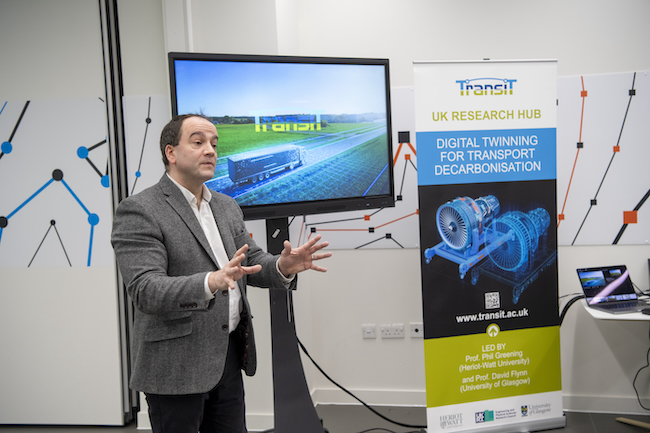UofG research and innovation showcased for Scottish Labour leader
Published: 17 January 2025
Leading figures from the University of Glasgow welcomed the Scottish Labour Party leader, Anas Sarwar MSP, to campus to showcase two key research and innovation projects.
Leading figures from the University of Glasgow welcomed the Scottish Labour Party leader, Anas Sarwar MSP, to campus to showcase two key research and innovation projects.
Mr Sarwar visited the University’s Mazumdar Shaw Advanced Research Centre (ARC) on Wednesday 15 January to learn more about TransiT, a national research hub for decarbonising transport, and Chemify, a groundbreaking digital chemistry spinout.

He was greeted by Professor Sir Anton Muscatelli, the University’s Principal and Vice-Chancellor, and Uzma Khan, Vice Principal for Economic Development and Innovation and Deputy Chief Operating Officer.
During the visit, Mr Sarwar visited the University’s ARC-XR lab, which hosts research on new applications of extended reality technologies, to hear about the TransiT team’s work from the project’s co-director, Professor David Flynn, before moving on to Chemify’s state-of-the-art laboratory space to meet its chief operating officer, Dr Alastair Leighton.
Mr Sarwar said: “Our visit to Chemify and TransitT at the University of Glasgow was an eye-opening glimpse at the academic and business potential that the university holds.
“It is clear that the University of Glasgow is full of talented people who are in the forefront of making Glasgow and all of Scotland a world-leader in cutting-edge technology, green tech and health sciences.
“Scotland's universities are full of innovation that's why I will work day and night to bring together the power of government, universities and business to make our country thrive.”

Chemify, a University of Glasgow spin-out company founded in 2019, is working to transform chemistry through digitisation and automation. Built on 15 years of research from Professor Lee Cronin's Digital Chemistry group, the company combines synthetic chemistry robotics, an extensive database of validated chemical reactions, and AI-enabled tools to design and manufacture complex molecules, with the goal of accelerating drug development and medicine creation for its partners.
Chemify, which now employs more than 130 people, is developing scalable pilot plants intended to become chemical 'giga factories' capable of discovering and manufacturing trillions of chemicals on demand for various sectors including pharmaceuticals, materials, farming, and green energy.
The company has already generated millions in local revenue and secured over £33m in series A financing in August 2023 from US and Scottish investors, along with UK Government support through the Innovation Accelerator programme. Chemify is currently exploring options for facility expansion in Glasgow to grow its workforce and develop a greater commercial presence in the region.

TransiT, a £46 million national research hub co-led by Professor Philip Greening of Heriot-Watt University and Professor David Flynn of the University of Glasgow, is leading the UK's transport decarbonisation efforts though digital twinning technologies. The initiative brings together eight universities and 67 industry partners to create a Federated Transport System of Systems which uses interconnected digital twins of road, rail, air, and maritime transport to integrate real-time data from sensors and infrastructure for testing and optimizing decarbonisation strategies.
By simulating future transport configurations and addressing challenges in interoperability, human-centred design, and data management, TransiT aims to identify cost-effective pathways to net-zero emissions while ensuring robust, inclusive solutions. The hub provides critical insights for planners, operators, and policymakers, helping guide sustainable investments and innovative business models, ultimately positioning the UK as a leader in transport decarbonisation and shaping the future of global mobility systems.
Professor Sir Anton said: “Research and innovation are at the heart of the University of Glasgow’s work, helping to drive economic growth and impact in Scotland and beyond. Chemify is a great example of how fundamental research can be spun out into new companies to enable breakthroughs across a range of sectors. Meanwhile, TransiT exemplifies how cutting-edge technologies like digital twins paired with virtual reality and modes of transport can be harnessed to deliver the national-scale change required to reach the UK’s net-zero goals.”
Uzma Khan said: “The University of Glasgow is working hard to maximise the economic potential of cutting-edge research in partnership with industry, as well supporting Scotland’s economic growth agenda through our innovation strategy and initiatives such as the Glasgow Riverside Innovation District.
“We are committed to translating our expertise in sectors like biotechnology, quantum computing, advanced telecommunications and life sciences to create new opportunities that will benefit our city region economy and our communities, and deliver impact at both the national and international level.”
First published: 17 January 2025

